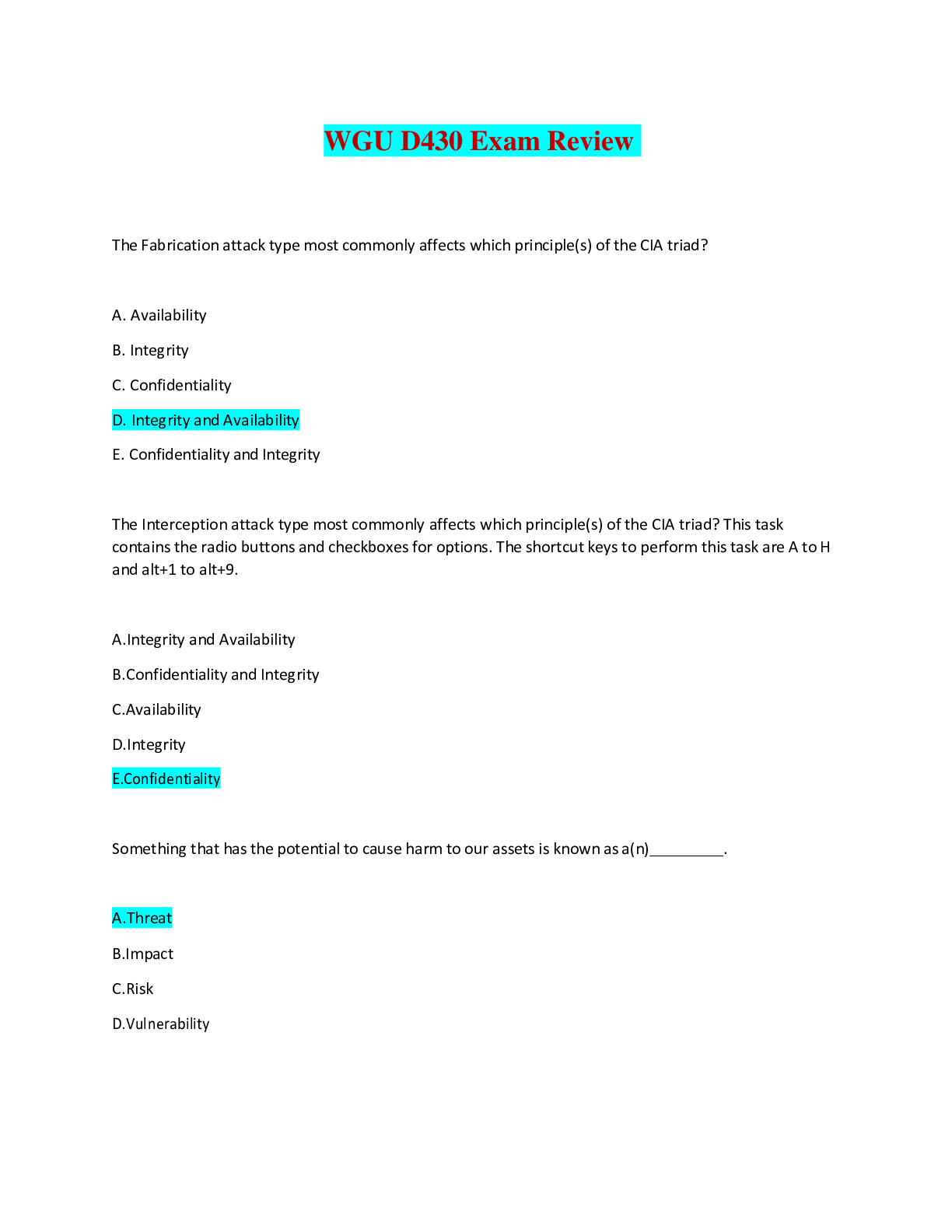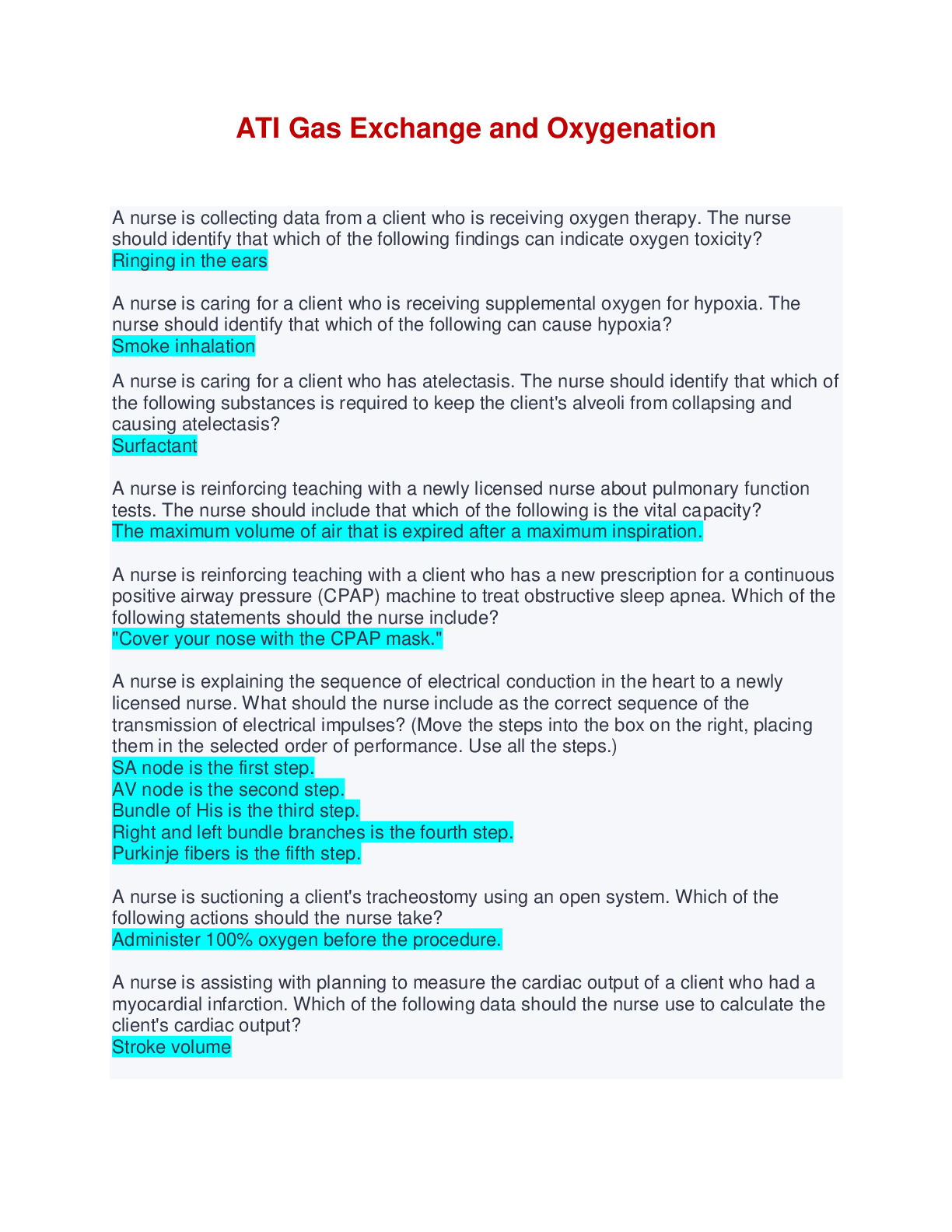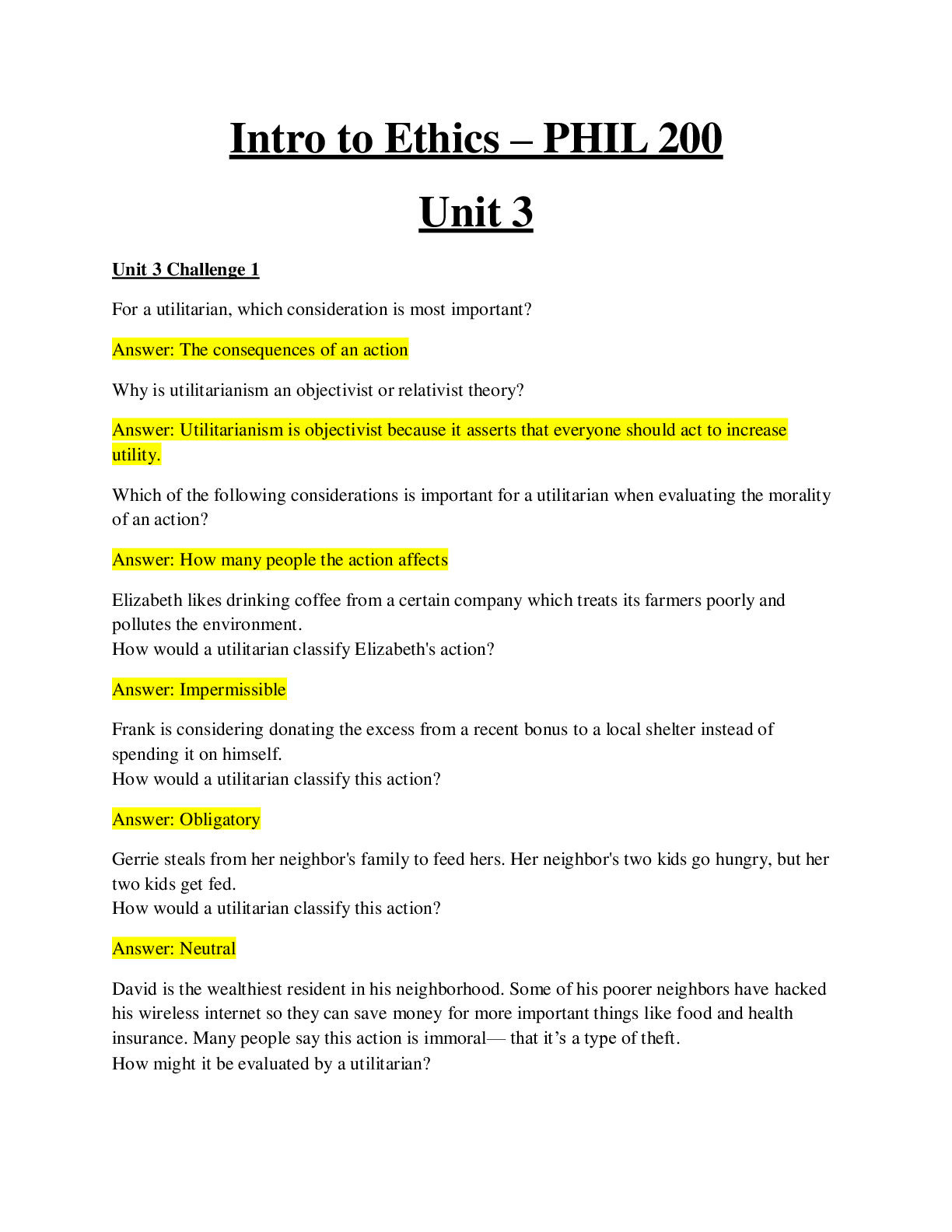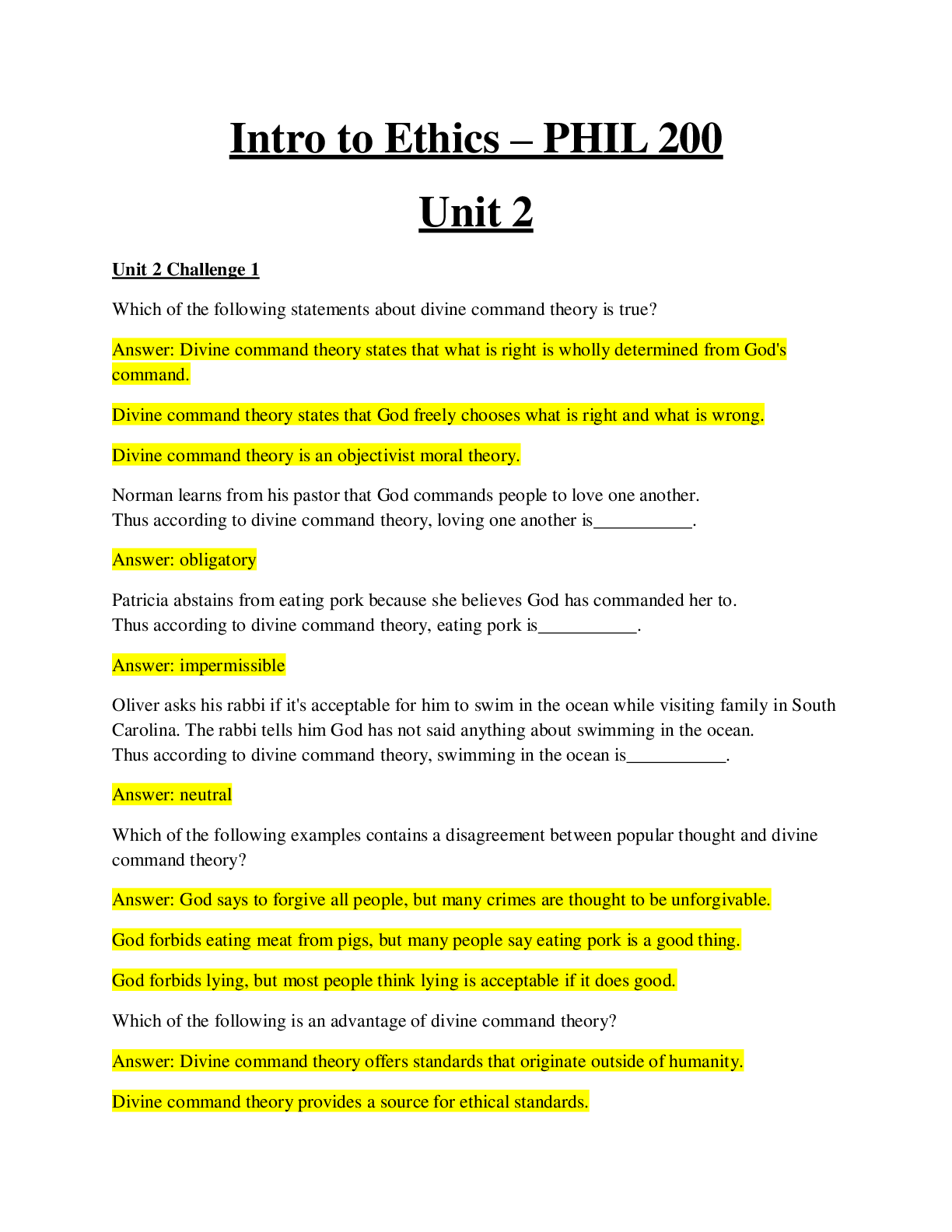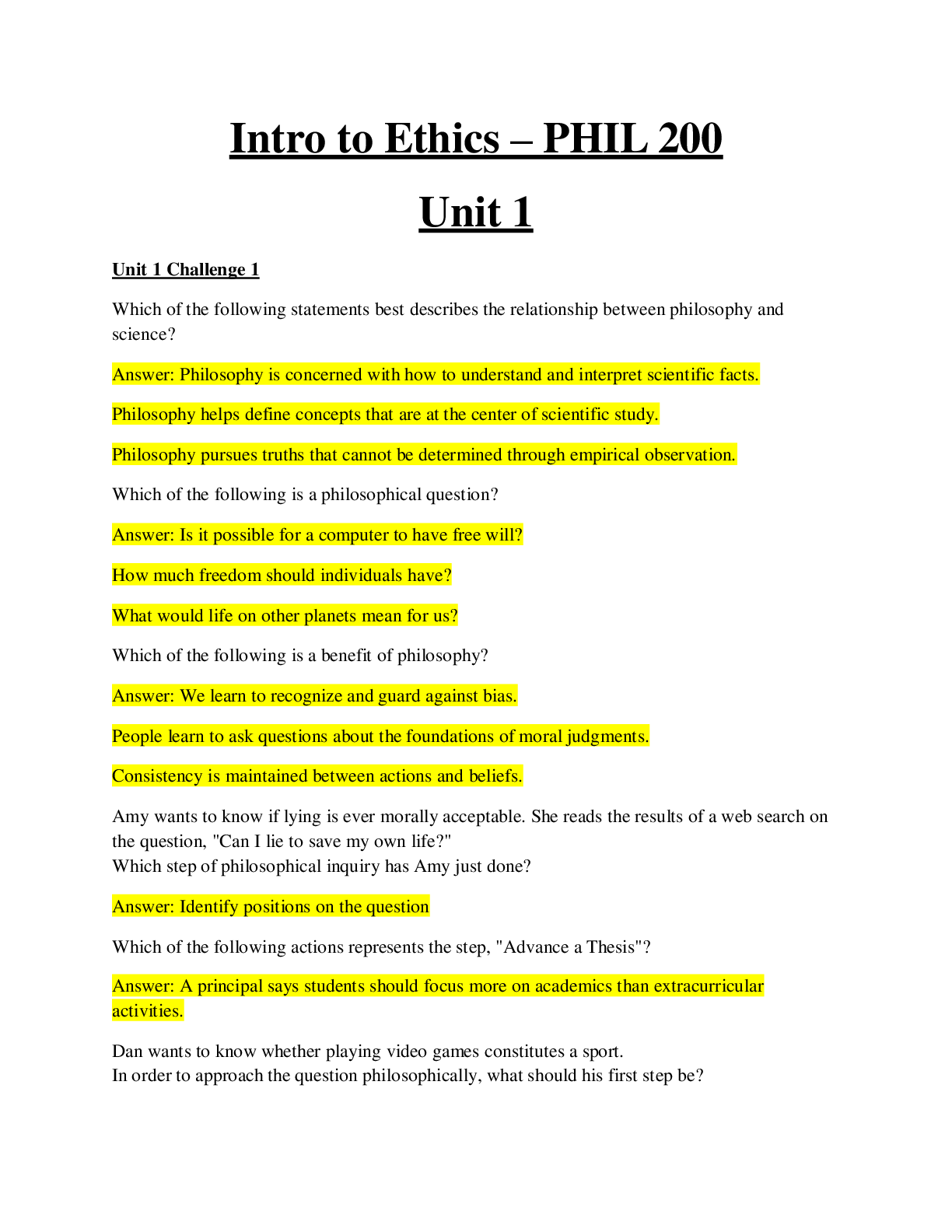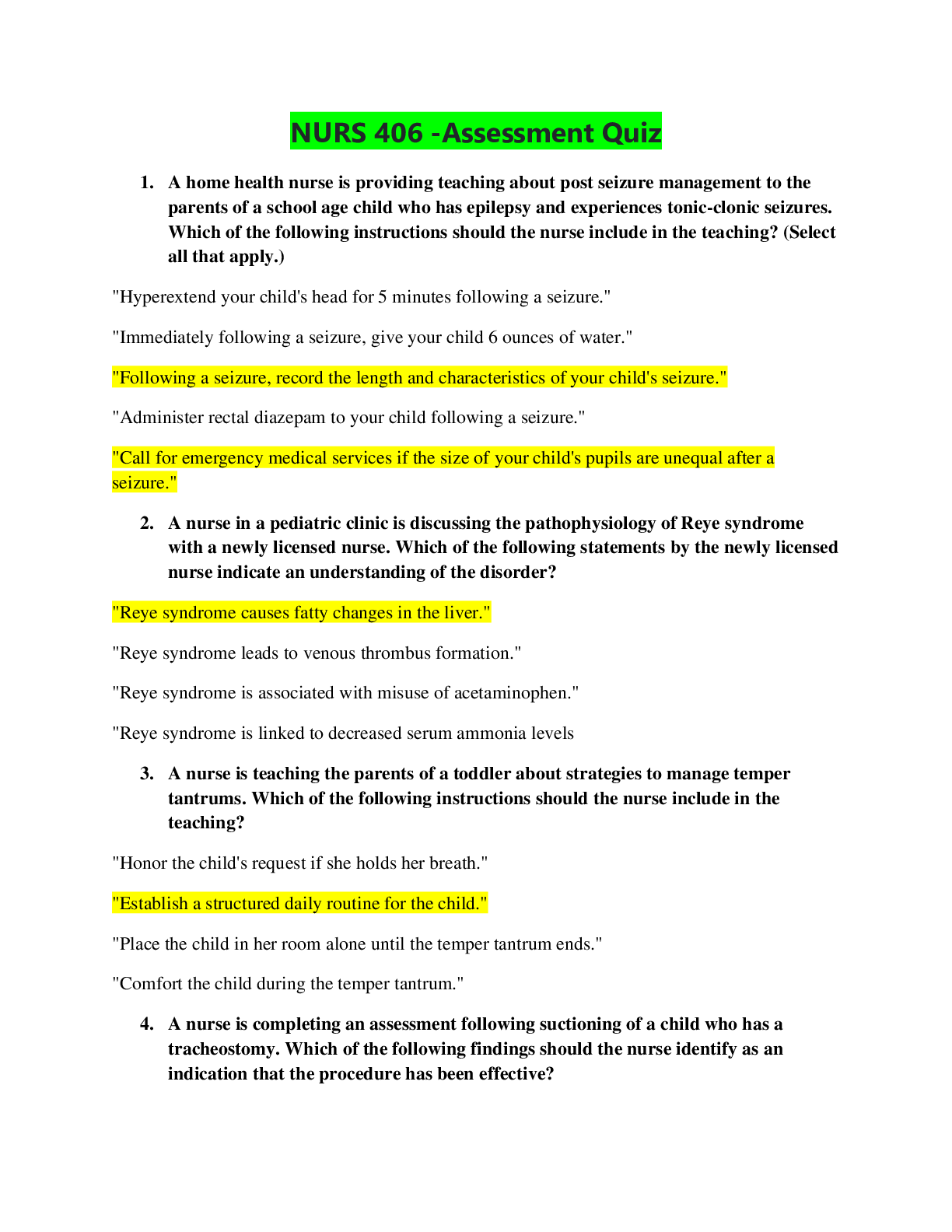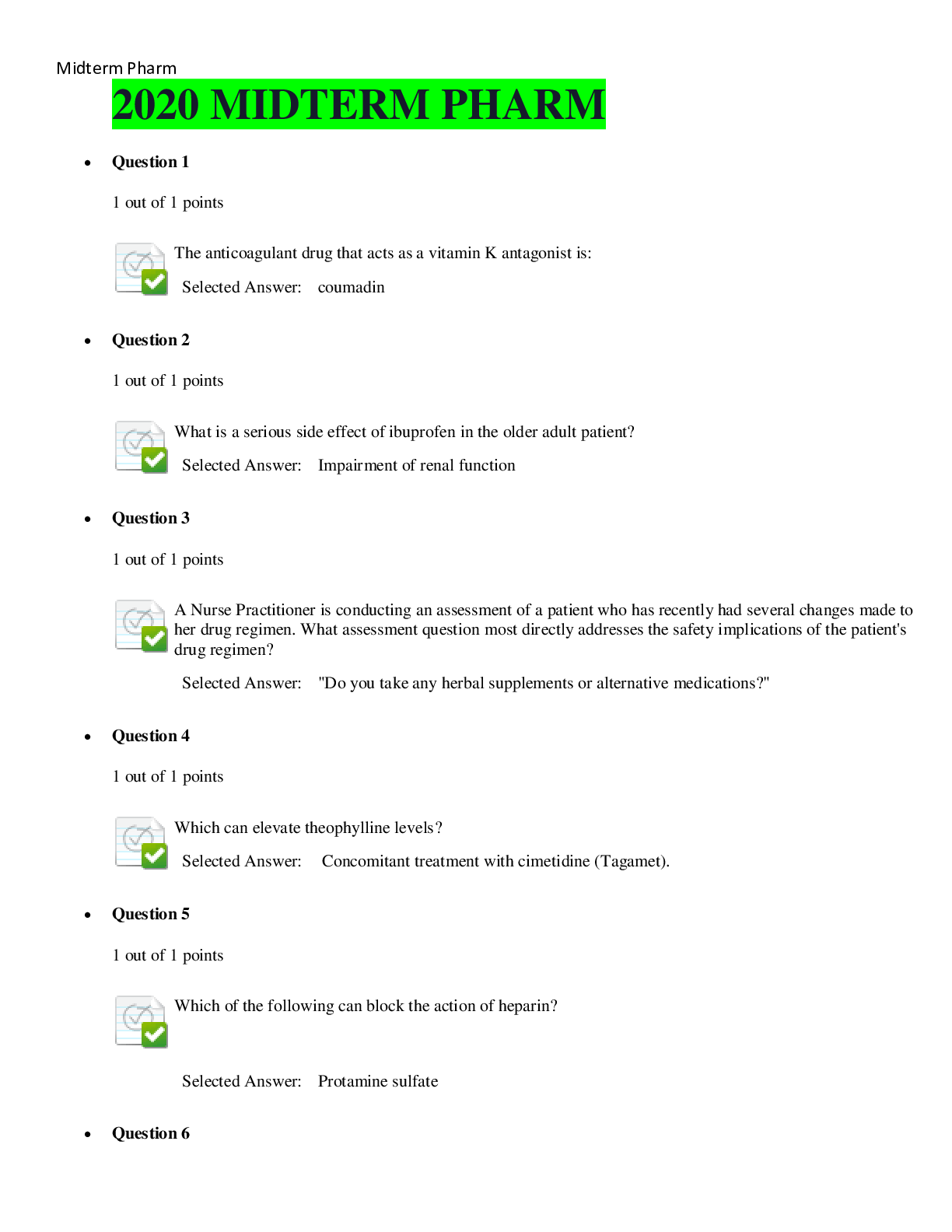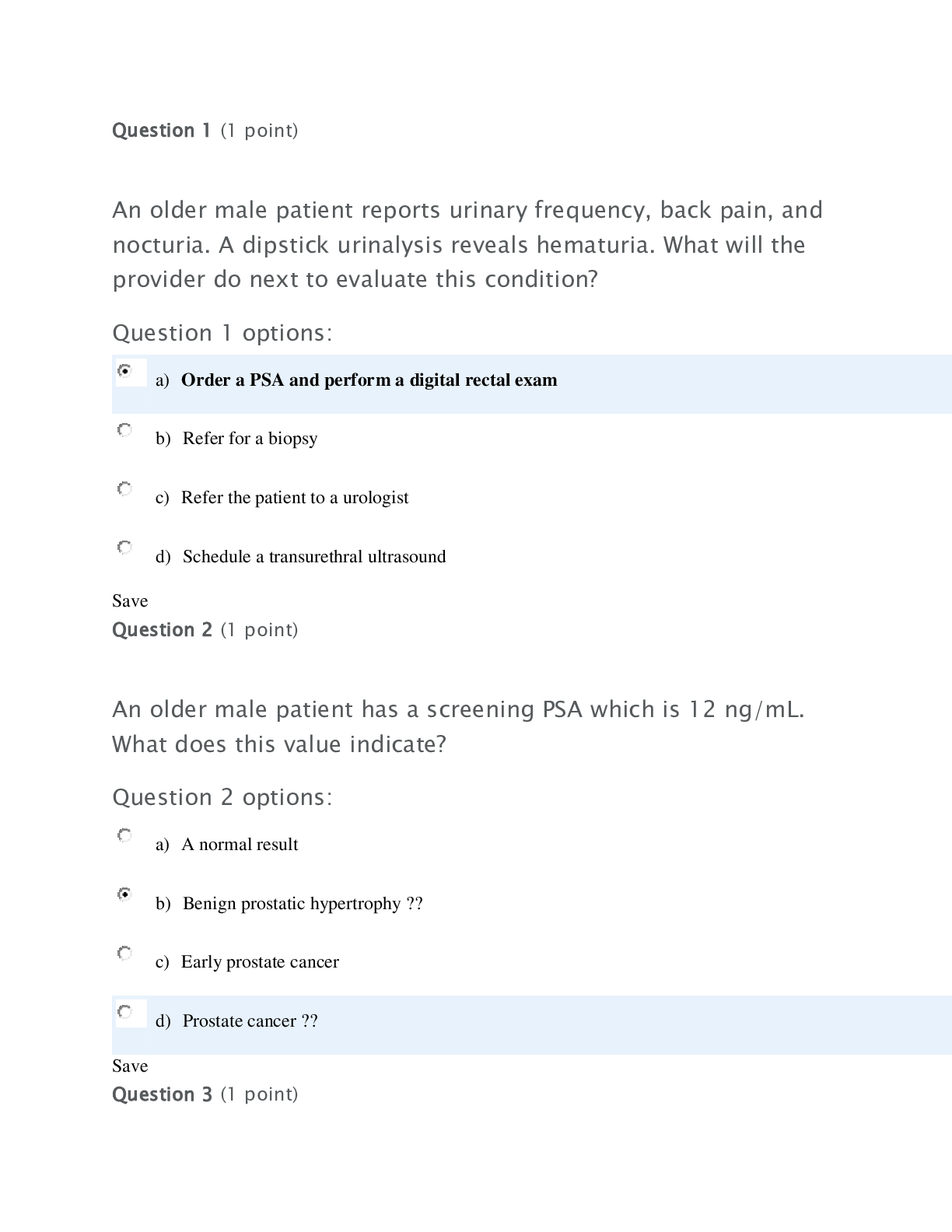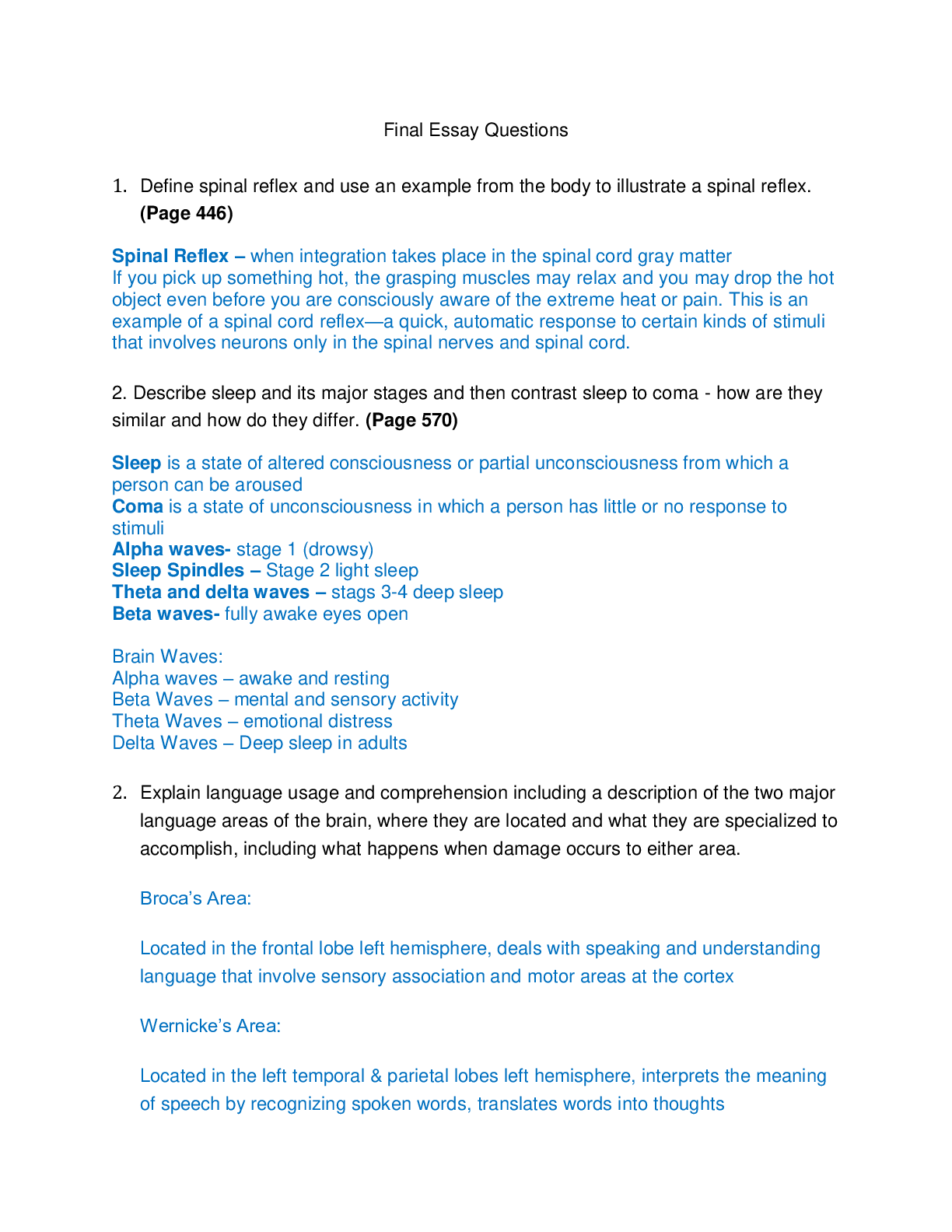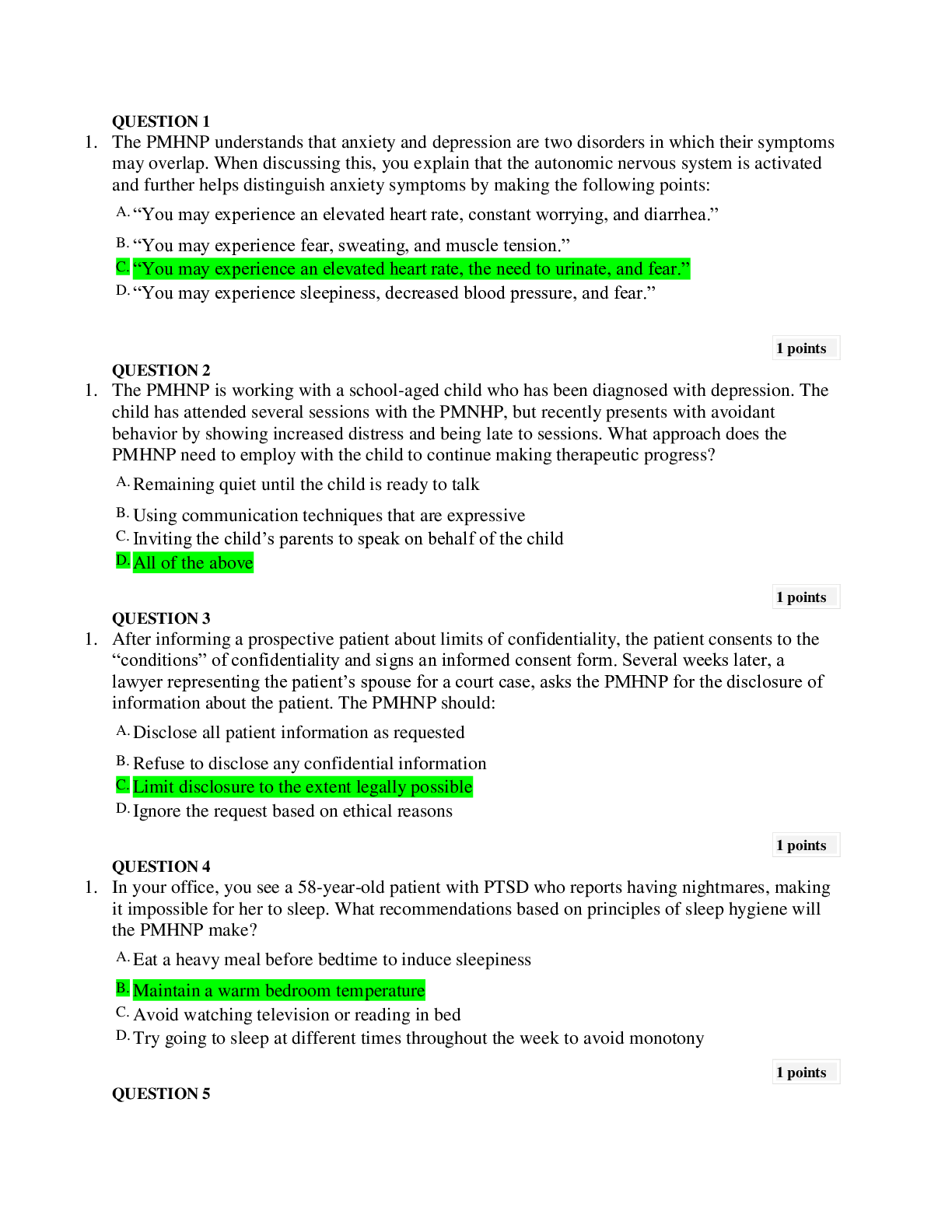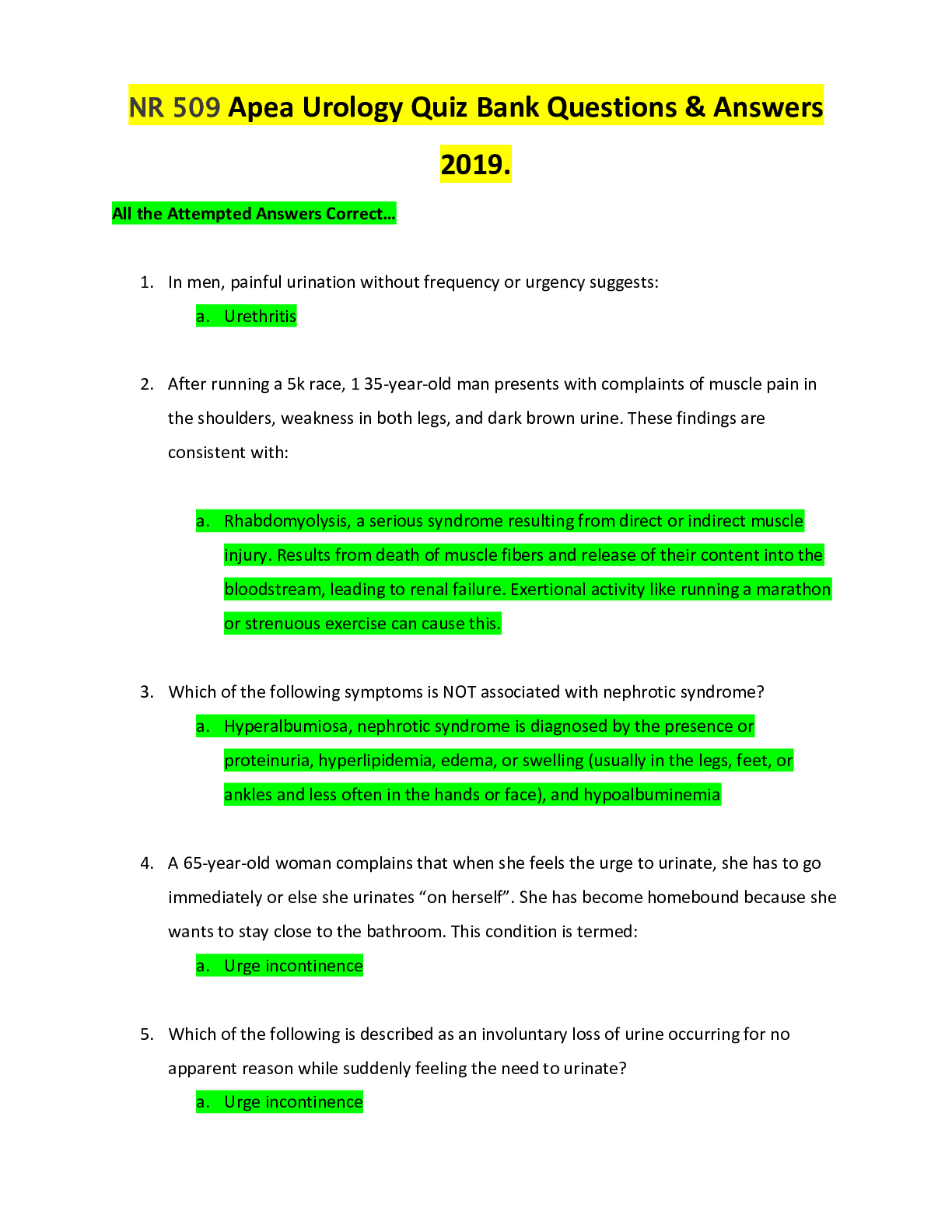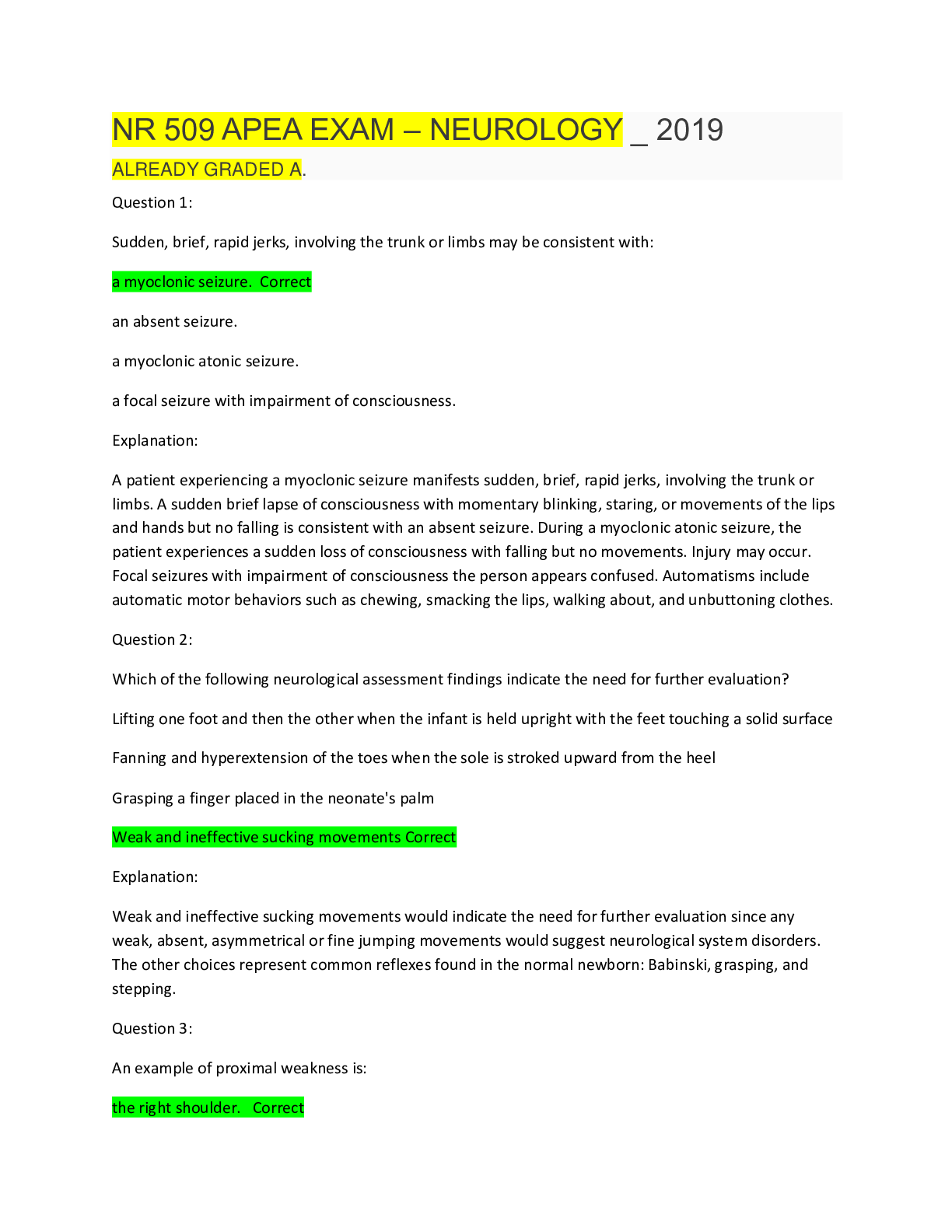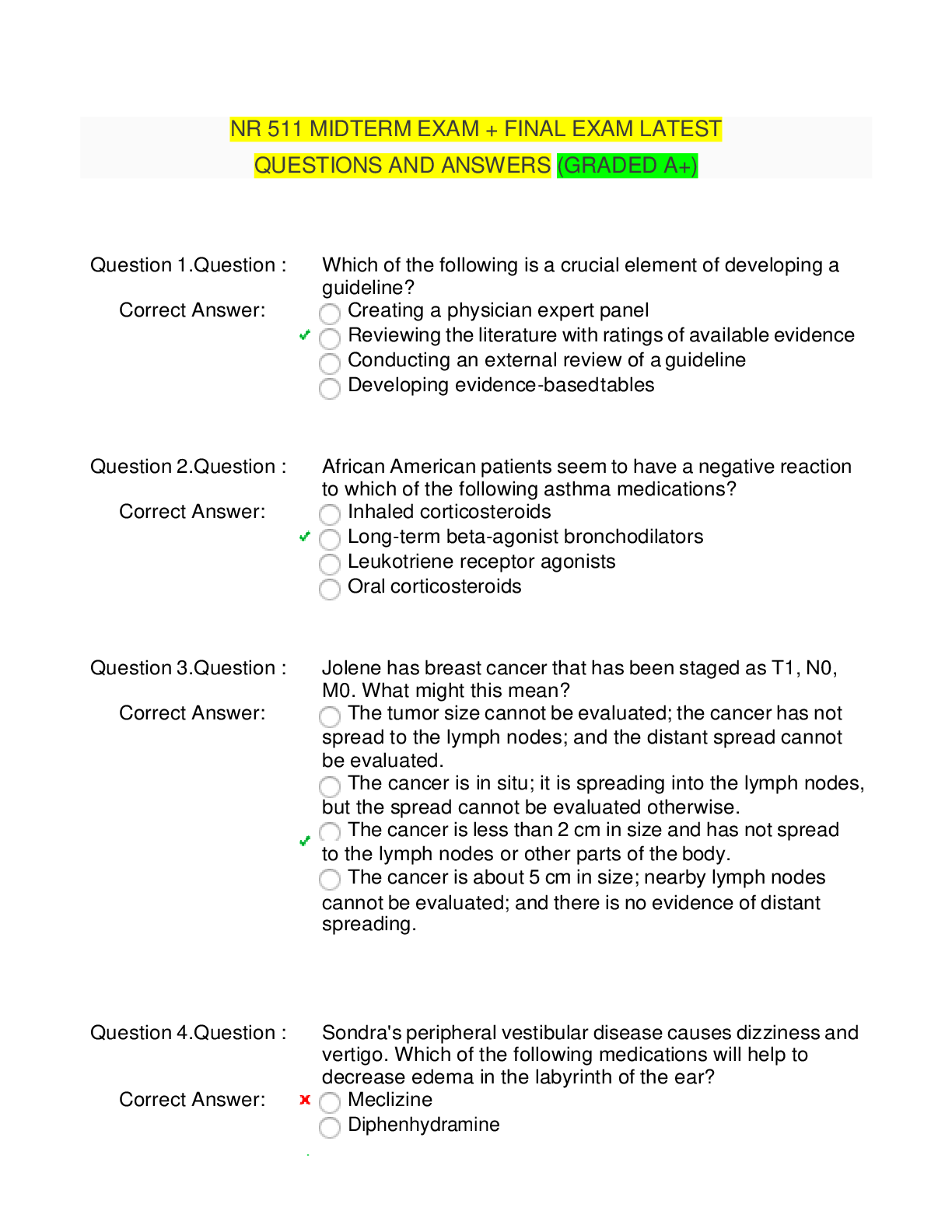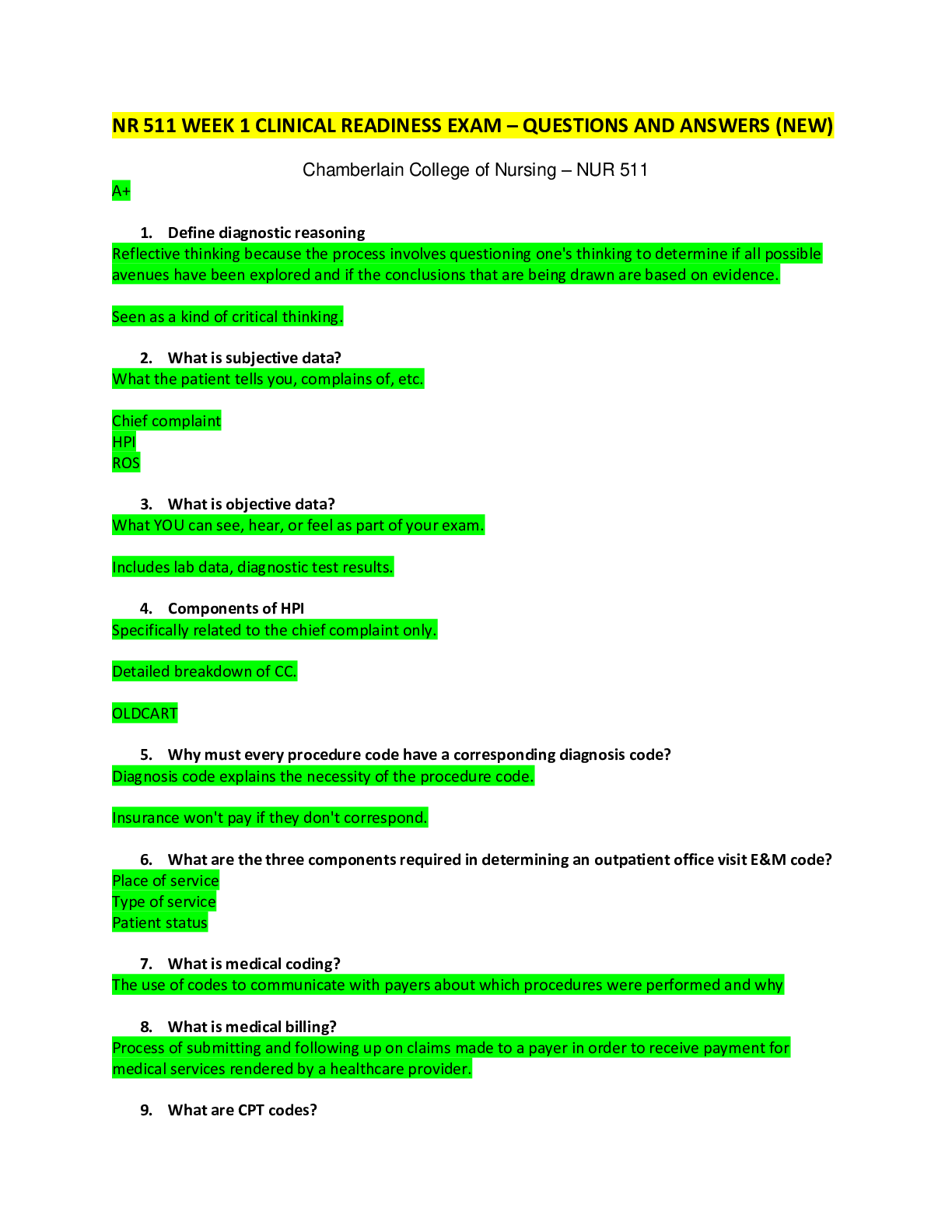*NURSING > EXAM > Chamberlain College of Nursing - ETHC 445 Final Exam / Notes Questions and Answers Rated A (All)
Chamberlain College of Nursing - ETHC 445 Final Exam / Notes Questions and Answers Rated A
Document Content and Description Below
ETHC 445 Final Exam / Notes ETHC-445 Principles of Ethics - Week 8 Final • This exam covers all 14 TCO's. • • For each of the following multiple choice questions, please select the Philos... ophy (and/or Philosopher) which best goes with each description below. • 1. (TCOs 2, 4, 5, 6) The idea that the assisted suicide of terminally ill patients should be allowed simply at the patient's direction reflects what type of ethics? (Points : 5) a. Hobbes' State of Nature b. Rand's Objectivism c. Aristotle's concept of Virtue d. Thomas Aquinas' concept of conscience e. Socrates' concept of excellence 2. (TCOs 1, 2, 7) What is the moral ideal of temperance? (Points : 5) Exercising control over one's own desires and inclinations Keeping one's temper under control Minimizing the impact of one's decisions Seeking the good of others before one's own Overcoming one's passions 3. (TCOs 1, 2) One of the common errors in Ethics is that of the hasty conclusions. Hasty conclusions consist of what? (Points : 5) Rushed work under pressure Comparing unknown cases to known ones to find precedents Embracing conclusions before examining cases fully Judging cases by the source of their origin Belief that first impressions are valid until challenged 4. (TCO 2) Prescriptive language is commonly used in ethics for what reason? (Points : 5) To indicate what is prohibited or impossible To indicate that one choice is better than others To show what actions are legal To convey requirements and obligations To indicate that there are really no choices available 5. (TCOs 7, 8) Ethical Egoism proposes that all decisions should be made to promote what? (Points : 5) Our fiduciary responsibilities The good will of others Our self-interests The welfare of the community Stronger relationships 6. (TCOs 2, 4, 9) Free people are motivated toward forming social structures according to a social contract in order to overcome what problem identified by Thomas Hobbes? (Points : 5) The need to overcome disagreements A perpetual state of warfare The establishment of a monarchy Taxation to support the costs of government Organized ways to select leaders 7. (TCOs 3, 6) Agricultural biofuels are not properly a renewable source of energy in the environmental ethics debate. Which of the following also is not a renewable source of energy? (Points : 5) Windmill turbines Hydroelectric power Tidal flow generators Biomass waste systems Solar cells 8. (TCOs 3, 6, 7) The notion that the only thing good without qualification is a good will is attributed to whom? (Points : 5) St. Thomas Aquinas Socrates John Locke Immanuel Kant Oliver Cromwell 9. (TCOs 8, 9) Which ethical concept is organized and directed toward following the greatest happiness principle? (Points : 5) Natural ethics and law Justice and mercy Rights and responsibilities Virtue-ethics of excellence Principle of utility 10. (TCOs 3, 6, 7) Syllogisms in formal deductive logic are called "valid" when: (Points : 5) the correct form of the syllogism style is used. the premise statements are true. the syllogism is first determined to be "sound." the verbs are written in present tense. the conclusion proceeds from the premises. 11. (TCOs 1, 2) When choosing one course of action while working with a dilemma, the other courses of action are lost and become unavailable. This makes ethical choices in dilemma situations particularly what? (Points : 5) Incoherent Complicated Illogical Painful Cruel 12. (TCOs 1, 2, 7) What is the role of conscience as Thomas Aquinas sees it? (Points : 5) To teach ethical principles To disclose and build religious faith To enable rational thought about consequences To align personal ethics with those of others To guide actions through a view of right and wrong 13. (TCOs 2, 8) The rule or principle to be applied in making decisions is an example of which kind of ethical discovery process? (Points : 5) Principle of utility A posteriori rationality A priori rationality Empirical rationality Scientific method 14. (TCOs 1, 2, 5) The Social Contract theorist whose troubled childhood was most clearly reflected in his theories was who? (Points : 5) Thomas Aquinas Thomas Jefferson Jean-Jacques Rousseau Thomas Hobbes John Locke 15. (TCOs 3, 6, 7) Kant's concern that people choose to observe universal laws as their duty is expressed through what actions? (Points : 5) Their habits Their maxims Their desires Their loves Their loyalties 16. (TCOs 2, 7, 8) Aristotle's Ethics of Virtue have found modern application for business and industry through what practice? (Points : 5) Resolution models applications Goals and objectives Core values of organizations Business models Professional codes of discipline 17. (TCOs 2, 8) Professional codes of conduct serve what function for business and industry? (Points : 5) Allow businesses to avoid training professional staffers Enable transfer of valued employees across state lines Enable contracting of temporary employees Specify continuing education needs and requirements Providing assurance of the professional qualifications of members 18. (TCOs 2, 7) Aristotle's Ethical Doctrine of the Mean measured personal virtues on a scale that included the virtue itself, the excess of it, and the deficiency of it. If the virtue is COURAGE and the deficiency is COWARDICE, what is the excess? (Points : 5) Wisdom Moderation There is no excess Recklessness Love 19. (TCOs 8, 9) In personal or organizational conflict, what benefits accrue to all parties when a leader or consultant employees one of the ethical conflict resolution models of Week 6? (Points : 5) Objectives of what winning the conflict means get refined and better understood Conflict management gets slowed down and settled. Conflict can be handled in a sequential, step-by-step manner Parties can be reconciled without solving the issues Personal relationships can be separated from issues 20. (TCOs 1, 2) The Latin term a priori describes the origin of knowledge developed rationally, and the term a posteriori describes knowledge developed through observation and experience. What is an example of ethics is best described as discovered in an a postiori manner? (Points : 5) Social ethics Care-based ethics Consequentialist ethics Theological ethics Operational ethics Page: 1 2 • • • Page 2 - Essays • 1. (TCOs 1, 2, 3, 7) In support of TCO #7 and in the Week 7 discussions, you developed and placed into the threaded discussions your personalized ethics statement of what has become important to you in the practice of ethics as you have practiced ethics during the course. Your first task in this question is to briefly present that personalized statement in just a few sentences before continuing with the question. Much of the rest of the exam will involve your working with that personalized statement through brief applications and cases. Use your ethical philosophy to solve the following ethical situation. Explain how your philosophy helped you make your decision. o Should citizens have an ethical obligation to serve their country when it is at war? Under what circumstances, if any, is it ethical for a person to refuse to serve? o A significant number of people believe war is always wrong, and that no circumstances justify one nation's taking up arms against another. Is this view ethically sound? How about realistically? Please state which side you agree with, and why. Explain and defend your position using your ethical position statement. o In answering, be sure to look at both sides of war: that is, a country defending itself against aggression and of a strong country coming to the aid of a weaker country that has been attacked unjustly. Then, explain how your ethical philosophy affected how you answered this problem. (Points : 30) • 2. (TCOs 1, 2, 7) Analyze the following ethical situation using YOUR ethical philosophy. Read the situation and then in your answer, explain why this is an ethical situation, what the "issues" are, and how an "ethical" person would resolve them. Explain how YOUR ethical philosophy has helped you read a conclusion about how to resolve or analyze this situation. o Employees' worth to their employers may diminish before they are eligible for retirement. In such cases, the employer is faced with the dilemma of choosing between retaining an old and trusted yet unproductive worker for 5 or 10 more years, or firing that worker and jeopardizing his or her retirement benefits. o 1. Should an employer have an ethical obligation to keep such unproductive, but loyal employees? What if the employee had been a problem his or her entire career? Are there certain circumstances where your answer to these questions would be different? o 2. What is the duty of an unproductive employee to his or her employer? Is there an ethical obligation to retire when productivity begins to wane? If a person is simply "coasting" for his or her last few years, is that person "unethical?" Be sure to explain your answer. (Points : 30) • • • • 3. (TCOs 1, 7, 9) How do you feel St. Thomas Aquinas would have solved the above ethical situation differently or the same as you did using your philosophy? Please explain the reasons for the similarities or differences. (Points : 40) • • • • 4. (TCOs 1, 2, 4, 9) A first-term junior senator has placed a bill before the Senate that promises to correct tax inequities that affect thousands of workers. However, the bill is being held up in committee. The senior senator who serves as Sub-Committee Chairperson is responsible. The senator, however, has learned of a secret scandal in the Chairperson's personal life. The junior senator visits the Chairperson and tells him that unless the bill is released from committee, he will divulge the scandal to the press. The Chairperson then releases the bill from committee and it is passed—and becomes law. • Identify and tell what ethical philosophy the senior and junior senators are using, if any. • Now, use your ethical philosophy to analyze the situation. Explain how, using your philosophy, you would have solved this situation either the same way as the characters in the situation did, or differently. Why? (Points : 30) • • 5. (TCOs 5, 6) You work for a grocery store and a new manager is hired to oversee your department. He comes into your department (the butcher shop) and explains to you that for the past 6 months, your department has been losing money for the store because of the waste and spoilage going on from having to discard unsold meat and poultry. He tells you that from now on, he wants you to package ground meat in smaller, more compact packages, with older meat on the bottom of the package (so it is not visible to the customer) and the fresher meat on the top, where it is visible to the customers. In this way, you can move more of the older meat and still receive the top dollar for it. As he leaves the department where you were having the discussion, he turns and says, "And by the way, one more month of losses like we had last month from this department, and you can kiss your job goodbye." • Will you repackage the meat in the way he requested? • Why or why not? Explain what ethical analysis you used to come to this conclusion. (Points : 30) • • • • 6. (TCOs 6, 8) Analyze your answer above using the Front Page of the Newspaper ethical dilemma resolution model. Show your steps. (Points : 40) 1. (TCOs 1, 2, 3, 7) In support of TCO #7 and in the Week 7 discussions, you developed and placed into the threaded discussions your personalized ethics statement of what has become important to you in the practice of ethics as you have practiced ethics during the course. Your first task in this question is to briefly present that personalized statement in just a few sentences before continuing with the question. Much of the rest of the exam will involve your working with that personalized statement through brief applications and cases. Use your ethical philosophy to solve the following ethical situation. Explain how your philosophy helped you make your decision. Anticipating the possibility that their soldiers may one day be captured by the enemy, some modern armies include in their basic training exposure to simulated yet intimidating torture (threaten) techniques. That is, they subject their own troops to mild forms of simulated torture in order that they may learn how to resist torture and not divulge (reveal) the plans and classified information that they know. Some other armies actually train through experience of torture. Is this practice justifiable ethically? If you believe it is justifiable only under certain conditions, specify the conditions. Explain and defend your position, and then explain how your ethical philosophy helped you come to this conclusion. My personalized ethical statement that I have created that is Action without guilt and charity with generosity, is the way to live a happy life. This statement was created based on the Couple philosophers' famous ethical philosophies which are the Categorical imperative of Kant, Utilitarianism of Mill, and Care based theory from three primary schools of ethics. As per my belief, I think the practice used to train the army troops are ethically justifiable because the training’s main purpose is to bring the positive outcome or the happiness by overcoming the fear of failure and incapability to protect from enemies. It is justifiable because the training was conducted with the consideration of possible torture from the enemy; and the army troops were given only the “mild form of simulated torture”, just to experiment if the techniques would work or not. They the troops were not prepared for possible danger, how else would they able to protect themselves, their men and the country? This action of giving the training, the “mild form of simulated torture” to the army troops was for the greater good. Theses subject, the participated troops put up their effort to tolerate the given training torture based on their generous and charitable heart to bring the possible outcome of happiness among the greater number of people. If theses men would have rejected their simulated training then, the army troops would not have learned how to resist that kind of possible torture or even worse from their enemies. Reference: Ruggiero, V. (01/2011). Thinking Critically About Ethical Issues, 8th Edition. [Bookshelf Online]. Retrieved from https://online.vitalsource.com/#/books/0077794575/ 2. (TCOs 1, 2, 7) Analyze the following ethical situation using YOUR ethical philosophy. Read the situation and then in your answer, explain why this is an ethical situation, what the "issues" are, and how an "ethical" person would resolve them. Explain how YOUR ethical philosophy has helped you reach a conclusion about how to resolve or analyze this situation. As a result of the economic down-turn starting in 2008, efficiency has become more and more the byword of the successful business person. The axioms of the efficiency expert are: "Eliminate what need not be done; simplify what must be done; combine tasks wherever possible." Putting this into practice means, among other things, eliminating people's jobs. Sometimes it also means making one person do two or three people's jobs. As company's gain the upper hand in employment (when the number of employees wanting good jobs is higher than the number of good (i.e. high paying) jobs available), they will more and more expect employees to be willing to work longer hours and to do accomplish more and varied tasks. 1. Under what circumstances is it ethical business practices to ask employees to multi-task or do more than one person's job? Making one person do more than more than two or three person’s job is unethical under any circumstances. It Is okay or ethical, when it is an employee is asked to do double shift or cover for another person’s job, once in a while getting paid for their work. 2. Under what circumstances is it ethical for an employee to refuse to do more work than can be taken on in a conventional 40-45 hours per week? In the circumstance, in which a person who is being paid a salary can refuse to work more than 40-45 hours per week, when the employer continually requires or asked the employee to do such work on a regular basis. In addition, there must be some context in regards to the expectations of others around that individual. If everyone on that team works 45 hours per week then it is a reasonable expectation that everyone does the same thing. However, if everyone works only 40 hours per week and the supervisor requires one person to work an extended amount then there is an ethical problem. Depending on the situation, especially when salaried, the amount of work to be completed is flexible and in some cases hours per week may be less than 40. Finally, if others are willing to work 40-45 hours per week on a normal basis then the person certainly has the opportunity to find employment elsewhere. To that extent I find little reason to defy working a few extra hours on an ethical basis 3. Let's assume that it is BECAUSE employees are willing to multi-task and do two or three people's jobs, that others LOSE their jobs. Who is more at fault ethically? The employer who requests the extra work from the remaining employees? Or the employees who are willing to do the extra work, thereby putting the others who aren't willing out of work? I think, it is the employer’s fault for not hiring the enough people to do the job efficiently. Asking and giving the ultimate to employees of working two to three people job’s or saying good bye to their own job; it is very unprofessional and unethical as an employer to do such act. On the virtue of scale, as an employer, if the virtue is generous then deficiency is at the stingy so, the employers is stinginess, who has not generousness and charitable heart. Appling my own philosophy here, employer’s action is full of guilt, forcing people to either quit the job or work more than they are required. This action is inhibiting the positive outcomes to both types of employees, the ones who want to work double or triple to keep their job and the ones who were refused to work like that. 3. (TCOs 1, 7, 9) How do you feel Aristotle would have solved the above ethical situation differently or the same as you did using your philosophy? Please explain the reasons for the similarities or differences. (Points : 40) Aristotle would have agreed with my decision on solving this dilemma because he believes that “the virtuous habit of action is always an intermediate state between the opposed vices of excess and deficiency: too much and too little are always wrong; the right kind of action always lies in the mean.” As per the Aristotle’s believe that employer in this dilemma is at the deficiency of the generosity which is stinginess. The way this employer is putting all those double-triple work load on those poor employee is “too much” and it is wrong action which is directly leading action as the unethical, regardless of his intention to save the business. The similarities in my believe and Aristotle is bringing the discipline and good action among the human nature. my believe on that is that doing the good on other will bring good on self. Whereas, Aristotle’s is by doing same the action over and over until lesson learned and bring improvement. Applying theses both statement on this circumstance, the conclusion still leads toward the employers as the irrational and unethical, as well as unprofessional. Reference: Aristotle Lecturette 4. (TCOs 1, 2, 4, 9) Regina is chairperson of her city's United Fund campaign. In her annual preparations meeting with her staff of canvassers, she gives this advice: "Hit the business places first. Don't approach anyone who is walking alone in a hall or working alone in a closed office. Look for two or more people standing together or working side by side. Try to make them compete with each other in generous giving. Capitalize on their desire to show off and outdo the next person." She then states that the canvasser who raises the most money of all will be awarded with a 5% cut of the total amount that canvasser raises. Her approach pays off and the United Fund raises the most money ever. Tell what ethical philosophy Regina is using, if any. Now, use your ethical philosophy to analyze the situation. Explain how, using your philosophy, you would have solved this situation either the same way as the character in the situation did, or differently. Why? Regina is employing Rand’s Objectivism approach with being solely concerned with self-profit and promotion, and “self- interested.” An appropriate ethical approach will announce how the sales would be made ethically and morally but Regina only cares about making a profit. My ethical philosophy is being generous and charitable on others with positive act. If Regina would simply treated other equally, like how she would wanted to be treated by others, (care based Theory), and assisted those who came for help, and been generous and positive instead of running campaign of the competition on by offering them a bribe of 5 %, she would have been successful because of positive outcomes through her Campaign of fund. Instead of making money through manipulative strategies designed to get more money Regina should try to appeal to the kindness and charity. And the, she would have collected Lot of fund which would have been more beneficial. 5. (TCOs 5, 6) You are a new employee in an advertising company. Your client is a well known soup manufacturer who wants to feature in advertisements a picture showing the solid ingredients in its soup. Unfortunately, your advertising group found that the solid ingredients sank to the bottom of the bowl and were barely visible. All that could be seen was the broth. Your boss hits upon a solution--put marbles in the bottom of the bowl before pouring in the soup! You try it and the vegetables sit nicely on the top, giving the appearance of thick soup. Your boss wants you to run with the project with this solution. What will you do? Explain why you will do this and what ethical analysis you used to come to this conclusion. (Points : 30) I would do the task. When considering the ethics or moral interpretation, this task is sensible and ethical. It may be self- interested but yet it is still ethical. There are many causes for continuing with this action. Initially, boss of the company desires to continue with this solution and it is my responsibility as a worker to follow the orders given by the boss. Therefore, it is ethical to continue with the solution provided because it is just for the advertisement picture only, that particular soup is not intended to serve the customer. The other cause to continue with the provided solution for advertising is the “humor”. It is practical for the owners of the company or advertisers to show the ingredient or components that are utilized to make the product so that consumers can decide that whether they desire (or have the necessity) to purchase the product or not. In the provided scenario, manufacturing company is making use of solid constituents such as vegetables to make the soup and desire to show the entire ingredients to consumers through advertising so that they can decide that product is healthy for them and charges of the company are also feasible. Moreover, vegetables go down in the cup when the soup is poured into it. Therefore, boss of advertising company takes decision to put marbles in the cup prior to pouring soup in it so that vegetables can remain up and consumers can see them. The intention of advertising company (that is to show ingredients of soup to consumers) is good to put marbles in the bowl or cup prior to pouring soup. Therefore, this decision will be taken as decision ethical. (Margaret Duffy, 2015) References Margaret Duffy, E. T. (2015). Persuasion Ethics Today. 6. (TCOs 6, 8) Analyze your answer above using the Blanchard and Peale ethical dilemmas resolution model. Show your steps. (Points : 40) 1. Is it legal? - Yes, it is legal because just putting picture for the advertisement is not causing harm to anyone. 2. Will I be violating a civil law or institutional policy? No, I would not be violating any law or policy. 3. Is it balanced? Yes, it is balanced. By the action of putting the marble in the soup for the picture do not disturbed the balance. 4. Is it fair to all concerned? No, it may not be fair, to the consumer who might decide to buy the soup who were compel by the picture in the advertisement. 5. Does it promote win/win situations? Yes, boss will be happy, I get to keep my job, and possible extended customers. 6. How will it make me feel about myself? If I do this, I would not be guilty because my action would not harm anyone. 7. Will I be proud? Yes, I will be proud. I save my job and my project is successful. 8. Would I feel good if my hometown newspaper published my decision? I would not feel good because I should have spoken up and make my advertisement group to come up with another better idea. 9. Would I feel good if my family knew about my choice? My family would have laugh and think that I and my team did humorous things After following the Blanchard and Peale’s Method, majority of the steps identify that my decision was not entirely wrong; however, I have realized that I should have talk to my boss and come up with the better solution or even try to fix make a new soup for that matter. I have realized even though, it is not directly causing harm to the consumer/customer, we are compelling them toward something that is not true and somehow, we the advertising company following “self-interested” ethical concept of Rand. At the end of the method, I am disagreeing with my own decision. Reference: Week 6 lecture Blanchard and Peale Method [Show More]
Last updated: 1 year ago
Preview 1 out of 14 pages
Instant download
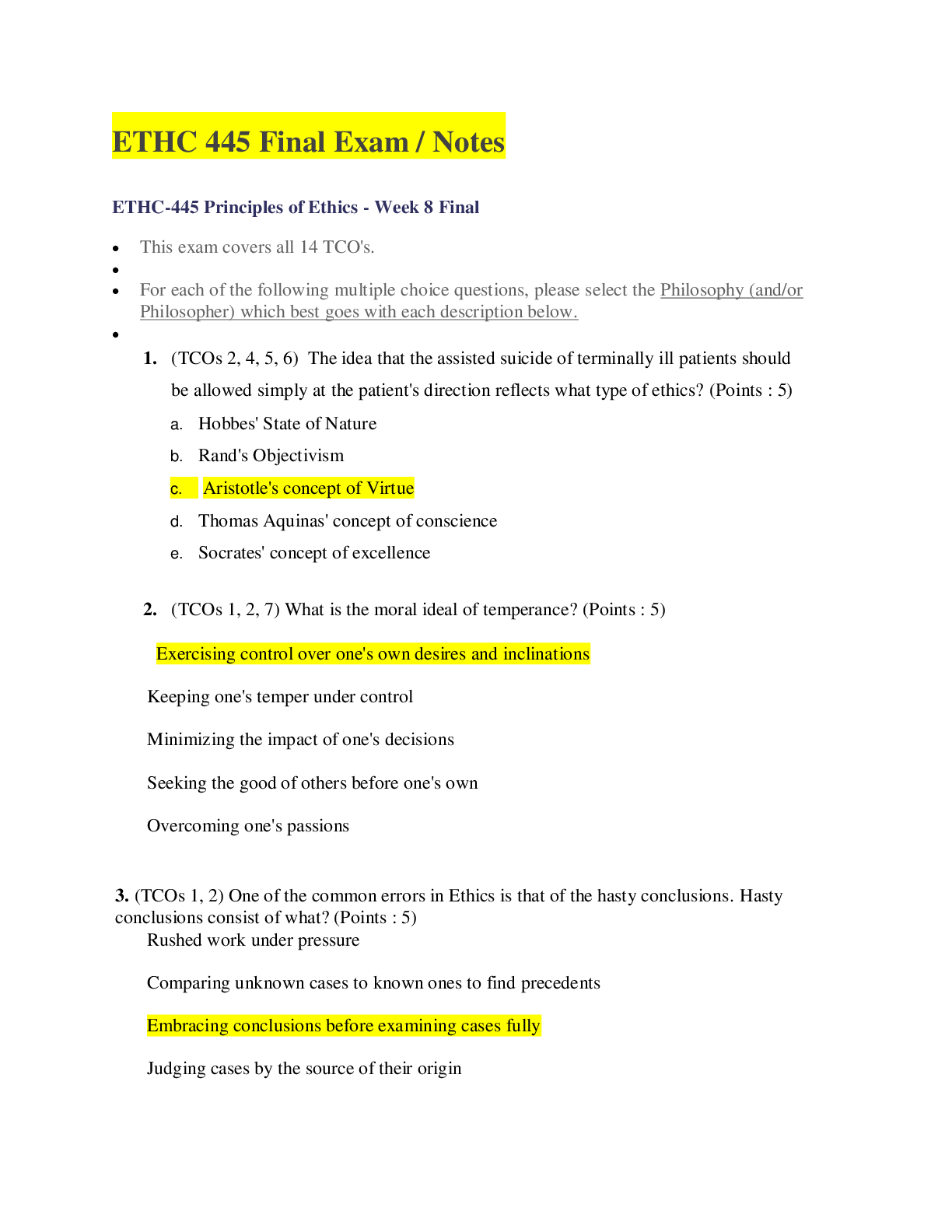
Buy this document to get the full access instantly
Instant Download Access after purchase
Add to cartInstant download
Reviews( 0 )
Document information
Connected school, study & course
About the document
Uploaded On
Nov 04, 2020
Number of pages
14
Written in
Additional information
This document has been written for:
Uploaded
Nov 04, 2020
Downloads
0
Views
63

